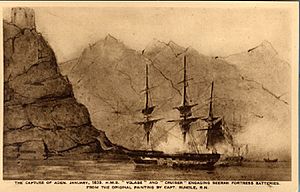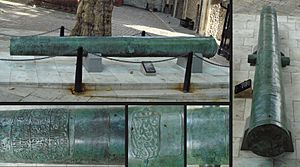Aden Expedition facts for kids
Quick facts for kids Aden Expedition |
|||||||||
|---|---|---|---|---|---|---|---|---|---|
| Part of Conquest of Aden | |||||||||
 Contemporary painting showing British warships engaging Sira fortress batteries |
|||||||||
|
|||||||||
| Belligerents | |||||||||
| Commanders and leaders | |||||||||
| Strength | |||||||||
| Land: 700 infantry Sea: 1 frigate 1 corvette 1 brig 1 schooner |
700 infantry 33 artillery pieces 1 fort |
||||||||
| Casualties and losses | |||||||||
| None 1 corvette damaged |
150 killed or wounded 139 captured 33 artillery pieces captured 1 fort captured |
||||||||

The Aden Expedition was a naval operation carried out by the British Royal Navy in January 1839. Britain wanted to take control of the port of Aden. This was because Aden was a great spot for ships to stop and refuel with coal. This was especially important for steamships traveling on the new route between Suez and Bombay (now Mumbai).
Aden was owned by the Sultan of Lahej. He did not want to give up his land. This led to several small fights between his forces and the British. To deal with these problems, a small group of warships and soldiers from the East India Company were sent to Arabia. The expedition was successful. The British defeated the Arab defenders who were protecting the fortress on Sira Island. They then took control of the nearby port of Aden.
Contents
Why was Aden important?
Aden is located in a very strategic place. It sits near the entrance to the Red Sea. This made it a perfect spot for ships to stop.
The Age of Steamships
In the 1800s, steamships became more common. These ships needed to stop often to load up on coal. Coal was their fuel. The route from Europe through the Suez Canal (which was built later) to India was becoming very important. Aden was a key stop on this route.
Britain's Plan for a Coaling Station
The British wanted to make sure their ships had safe places to refuel. They decided Aden would be a great "coaling station." This meant it would be a place where ships could get coal and supplies. This would help them control trade and travel to India.
The Expedition Begins
The Sultan of Lahej, Muhsin ibn al-Fadl, did not agree to give Aden to the British. This led to tensions and small battles. The British decided to send a strong force to take Aden by force.
British Forces Arrive
The British sent a naval force led by Captain Henry Smith. His ships included:
- HMS Volage, a large frigate with 28 guns.
- HCS Coote, a smaller warship with 18 guns.
- HMS Cruizer, another brig with 18 guns.
- HCS Mahi, a schooner with 5 guns.
They also had about 700 soldiers. The Sultan's forces had about 700 infantry soldiers. They also had 33 cannons and a strong fort on Sira Island.
The Battle for Aden
The British ships attacked the fortress on Sira Island. This fortress was well-defended with cannons. The British warships fired their cannons at the fort. The battle was intense.
Taking the Fortress
The British forces managed to defeat the Arab defenders. They captured the fortress on Sira Island. They also took control of the port of Aden. The Sultan's forces suffered about 150 soldiers killed or wounded. The British captured 139 of their soldiers and all 33 of their cannons. The British had no soldiers killed, but one of their ships, the HCS Coote, was damaged.
After the Battle
After their victory, the British took full control of Aden. It became an important part of the British Empire. Aden served as a vital coaling station for many years. It helped Britain maintain its power and trade routes to India and beyond.
See also
- Punitive expedition
- Nukapu Expedition
- Johanna Expedition

